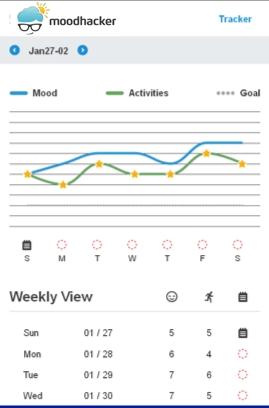 A cognitive behavioral therapy-based mobile app can be effective in treating depression symptoms, but is more effective in combination with an employee assistance program, according to a new study by Orcas of their MoodHacker app.
A cognitive behavioral therapy-based mobile app can be effective in treating depression symptoms, but is more effective in combination with an employee assistance program, according to a new study by Orcas of their MoodHacker app.
"To date, very few randomized clinical trials of mobile apps targeting depression and emotional well-being have been published in the peer-reviewed literature," Michael Mulvihill, CEO of Orcas, said in a statement. "We're excited to be contributing to the mobile health research community. The results of the study tell us we're moving in the right direction."
Orcas, which originally stood for Oregon Center for Applied Science, was founded in 1989 as a research organization looking into ways people could use technology to improve their own health. The organization has developed a number of mobile health apps and other interventions with funding from the National Institutes of Health. It transitioned in 2013 from a government-funded research group to a commercial company, offering their clinically validated apps as B2B products for employers.
MoodHacker takes a self-management approach to depression management. Users can track their mood on the app along with other factors like food and activity, to educate themselves about what things correlate to different moods. The app responds to the data with analysis and videos about depression.
The randomized control trial looked at 300 employed adults with mild-to-moderate depression. Of these, 150 used the Moodhacker app for six weeks and 150 were given access to a website with on-demand education information about depression. Researchers examined the effect of the intervention on both self-reported depression symptoms and workplace outcome measures like absenteeism and productivity loss. The intervention stopped after six weeks, but researchers followed up at 10 weeks to check for residual effects.
At six weeks, the study showed significant results for depression symptoms, but much stronger results among those with employee assistance programs. Those who used the app also scored better on behavioral activation, depression knowledge, and management of negative thoughts. The only worksite outcome that was affected for all app users was work absence, but for those with EAP access, effects were also found on prouctivity loss and workplace distress.
"What pleased us most is that we achieved essentially the same effect sizes on depression symptoms in this study as reported in previous meta-analyses of internet-based CBT programs, which require a much larger time commitment than the brief daily interaction promoted in MoodHacker," Amy Birney, MPH, a behavioral scientist at Orcas and lead author of the study said in a statement.
Only one outcome measure was still affected at the 10-week follow-up, however: workplace absence. This suggests that more research is needed into how to produce sustained engagement or a sustained behavioral effect in depressed populations.














